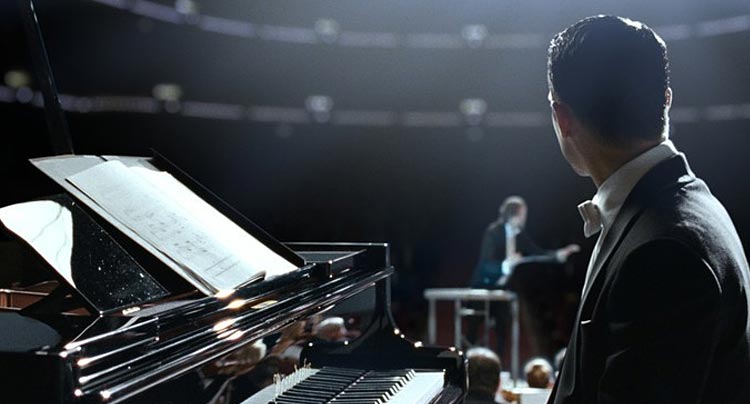
A gripping, yet totally implausible, psychological thriller.

A gripping, yet totally implausible, psychological thriller.
Every once in a while, we all see one of those special films – something that pushes the boundaries, defies expectations, breaks down the walls and makes us reconsider what is possible in the world of film making. Eugino Mira’s Grand Piano, starring Elijah Wood, is just such a film – it is a movie that challenges you, radically expanding one’s notion of how you can blow several million dollars at a single go– several big-name actors, technical-virtuosic production value, and the most improbable plot line you could ever think of.
The film takes the notion of piano recital jitters to the utmost extreme – musical prodigy Tom Selznick (played by Wood) returns to the stage after a long hiatus, hoping to reclaim the spotlight after an embarrassing bout of stage fright five years before. With the support of his wife, successful actress Emma Selznick (Kerry Bishé), things seem to be looking up for Selznick.
That is, until the performance – Selznick suddenly discovers an ominous note left on his sheet music, warning him if he plays one wrong note he will die. Thus we are launched into a psychological thriller so intensely implausible it’s hard to know what to make of the whole thing. Was the film meant to be funny? Indeed, it’s campiness and ironic touches of humor (from the wife’s crazy best friend and her tagalong husband, to the obnoxious comments that Wood receives from well-wishers throughout the film) could lead one to think it was all made in jest.

If Hitchcock made the film (who Mira is certainly drawing from), perhaps we could take it more seriously, but as it stands Grand Piano seems caught between its serious delivery and the sheer corniness of everything else. Thus we are left with this bizarre, campy film that appears unaware of it’s own silliness. Toss in a few odd Citizen Kane references, John Cusack’s random appearance as the film’s villain, and the distracting height difference between Wood and his leading lady, and you leave the theatre not sure whether to laugh or simply wish you had seen something else. Let’s face it – the movie is essentially about a piano player who hopes his audience won’t shoot him.
To the film’s credit, the production value was astoundingly high, and technically excellent – it featured beautiful cuts, musical scoring, lighting and all the rest. The actors did the best they could, adding to the film’s crisp and well-executed feel. Indeed, the fluidity of the whole thing (along with its subtle hints of humor) is what saves Grand Piano. It’s fast-paced, gripping style is engaging despite the plot’s overwhelming implausibility – the movie’s ridiculous, but it looks so good viewers it’s hard not to want to believe what’s onscreen.
As a brief aside, the film is surprisingly insightful in its portrayal of stage fright – not just the anxiety, but the obnoxiousness of compliments, words of encouragement and annoying well-wishers. But best of all is the ultimate, ridiculous realization, (and insult to every perfectionist out there), that for all your fear, the audience probably won’t notice if you screw up (though they might try to kill you for it if they do).